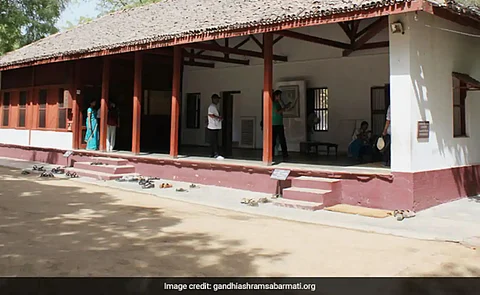

Ahmedabad | The Gujarat High Court on Monday refused to entertain a plea filed by two residents of the Sabarmati Ashram who were unhappy about the compensation they were offered to vacate their houses for the redevelopment project.
The division bench of Chief Justice Sunita Agarwal rejected petitions moved by Jayesh Vaghela and Karan Soni, residents of the ashram premises, after a single judge bench had earlier refused to entertain their plea.
The petitioners claimed that in the MoUs that the district authorities had offered them, they were given three choices as compensation to vacate their premises — Rs 90 lakh cash, a flat or a tenement.
They alleged that they had been duped as there was a fourth option of land plus Rs 25 lakh and a two-year rent of Rs 12,000 per month, which was not disclosed to them when the MoU was signed.
The petitioners decided to accept the cash compensation instead of a flat or tenement of equal valuation.
Local authorities have offered compensation to 260 long-term tenants of Sabarmati Ashram premises to acquire their properties as part of the Rs 1,200-crore project that aims to revamp the infrastructure surrounding Sabarmati Ashram, provide state-of-art amenities to visitors, and establish a world-class memorial dedicated to Gandhiji.
The court observed in its order that the petitioners signed the MoU dated October 4, 2021, indicating that they consciously chose the option for cash of Rs 90 lakh.
Soon after they signed the MoUs, they were paid Rs 60 lakh on the condition that they would have to vacate the property within 30 days.
The petitioners, however, did not comply and filed the plea seeking a stay on demolition initiated by the state authorities.
In a judgment dated February 29, 2024, a single judge bench of the High Court dismissed the petitions, noting that the petitioners had duly signed the MoUs.
Three options were given to the petitioners, as approved by this court in a PIL, out of which they chose to accept Rs 90 lakh cash, it observed.
They, however, illegally refrained from handing over their properties, which were then sealed and a notice issued to them.
"The submission made by the petitioner is not substantiated from any material on record nor any instance has been placed before us where such an option has been given or exercised by any of the 260 long-term tenants of Ashram," the court observed in its order.
The assertion of a fourth option was based on the document contained in the communication of the sitting mamlatdar of Sabarmati, it said.
"On a query made by the court, the petitioners could not bring any such instance of grant or allotment of land along with money as indicated as a fourth option. We can't take any exception to the three options given in the MoU," the court said.
The court further said it did not find any substance in the challenge of the order of the single judge.
The petitioners appear to have had second thoughts after receiving Rs 60 lakh, and instead of vacating the property, they retained its possession and refused to receive the remaining compensation of Rs 30 lakh, it said.
"We may further note that the act of filing a petition, that too in 2024, is nothing but an afterthought. We may further note that both the petitioners have received the remaining amount of Rs 30 lakh and handed over vacant possession of the property on March 1, 2024 thereafter the properties in question have been demolished," it said.
